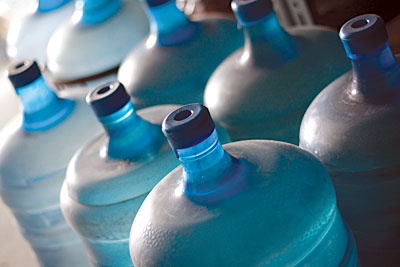 |
Illegal water bottlers, most of them operating in small-scale 'one-room' factories, have severely hurt the water bottling industry and pose significant health risks to consumers.
By law, water bottlers require a license to market their product from the Department of Food Technology and Quality Control (DFTQC) and registration with the Department of Small Cottage and Industries. DFTQC checks for acidity levels, the presence of harmful chemicals � such as arsenic and cadmium � and especially microbes, which pose the greatest danger in the Kathmandu Valley.
There are 73 licensed bottlers in the capital, but the number of illegal bottlers is unknown as the government has not been responsive to calls for a full accounting by industry leaders and experts. "Illegal bottlers have a huge price advantage over their legal counterparts since they don't invest in proper purification processes and techniques," says industry specialist Jogendra Prasad Rauniyar.
Illegal bottlers either fill used containers purchased from recognised brands or buy easily available caps and labels, which cost Rs 2-5, to mislead consumers. Since they forgo the purification process, the production cost per litre bottle is just Rs 10-15. This is about Rs 5 less than the production cost per bottle borne by legitimate companies.
The purification process varies depending on the source of the water: river, spring or groundwater. Most companies in Kathmandu use groundwater, and run it through at least three filters to eradicate any chemicals or microbiological matter and 'soften' it to make it less harsh on the digestive system. While many of these companies market their products as mineral water, in fact no minerals or nutrients are added, as that would raise prices to uncompetitive levels.
This is usually enough to meet DFTQC requirements. Those who are caught flouting requirements are fined Rs1000-2000 and have their license revoked if they are guilty of multiple offences. Last year, four bottling companies were shut down.
However, regulators are strapped for cash and manpower. They are only 10 inspectors for the valley, though at least 40 to 50 are required, and they operate according to an outdated food security act dating from 1967. Pramod Koirala, a regulator with DFTQC, says, "We have drafted a new act, but this cannot come into effect until the constitution is completed. The new act will increase penalties, which currently reflect 1960 prices, and increase the number of food inspectors."
Be that as it may, the regulatory measures may be wrong-headed. "Current regulation focuses on the safety of the final product, but more emphasis should be placed on the cleanliness of the source of water," says conservationist Hum Gurung.
What's worse, a price war and unhealthy competition between companies have led to the cannibalisation of profit margins. "Many companies are selling their products at a loss. A bottle should cost at least Rs 15-20, but is often sold at less than Rs 10 in bulk," says Suman Pradhan of the Nepal Bottle Water Industries Association (NBWIA).
NBWIA is at the forefront of a campaign to counter such challenges by bringing more transparency to the illegal trade, encouraging healthy competition and improving consumer awareness. In the last two years, many city-level associations have formed under its wing.
"We must make safety our number one priority. It will be tough, but there is a hopeful future for this industry," says Pradhan.
READ ALSO:
Lost in the smog - FROM ISSUE #500 (30 APRIL 2010 - 06 MAY 2010)


